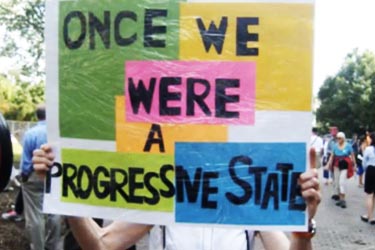‘Moral Monday’ Protests Grow in North Carolina, With Support for Women’s Rights Advocates
Each week's Moral Monday protest has a theme, and this Monday activists will focus on labor and economic justice. A key factor will no doubt be the economic impact the GOP's new regressive policies would have on women.

Last week over 80 North Carolinians were arrested at the state capitol after unlawfully trespassing as part of the ongoing “Moral Monday” demonstrations in the state to protest GOP over-reach in the 2013 legislative session. Led by the North Carolina NAACP and numerous religious leaders and progressive coalitions, the growing number of protesters are fighting back against state politicians who are eager to roll back health care access and voting rights, attack public schools, and destroy the social safety-net programs on which so many state citizens rely.
Each week’s Moral Monday protest has a theme, and this Monday activists will focus on labor and economic justice. A key factor will no doubt be the economic impact the GOP’s new regressive policies would have on women. A recent survey of Moral Monday protesters showed that 60 percent of them are women, and that the average age of the protesters is 53, with a full quarter of them under age 35. Man of these women—and protesters in general—are no doubt aware that lawmakers refusing to expand Medicaid, banning insurance coverage of abortion on the state insurance exchange, and transferring low-income reproductive health-care dollars to crisis pregnancy centers will both directly harm poor women and keep people living in poverty who might otherwise see an improvement in their economic outlook.
It’s for those reasons that NARAL Pro-Choice North Carolina is so supportive of the NAACP’s Moral Monday efforts, especially as they highlight the effects of the state GOP’s agenda on women. “This is bigger than reproductive rights,” Erin Arizzi, communications associate for the group, told Rewire. “This is about disenfranchising the vulnerable in our state. But reproductive rights is obviously a part of this. Reproductive rights are always a major aspect of any fight for economic justice. The people who will be most affected by the kind of laws that are being considered are the lower income, the women, and the people of color, and especially those who live in rural counties.”
“This is about protecting the people that this government has decided no longer need protection, and standing up for them,” she added.
Like many other local progressive organizations, NARAL Pro-Choice North Carolina members have shown up at Moral Monday protests with signs and petitions targeting Republican Gov. Pat McCrory about his promise not to sign any bills restricting reproductive rights. The efforts complement the group’s “She Decides” campaign, which encourages North Carolinians to tell the governor that he must answer to the will of the majority of the voters who elected him rather than the lawmakers of his party, who are pursuing their own agenda.
And it is a majority of the voters. According to polling conducted by Public Policy Research this March, 76 percent of individuals surveyed said they agree with the statement “Ultimately, decisions about whether to choose adoption, end a pregnancy, or raise a child must be left to a woman, her family, and her faith, with the counsel of her doctor or health care provider”; 64 percent said they strongly agree.
NARAL Pro-Choice North Carolina willtake the thousands of signatures collected and deliver them to Gov. McCrory, stressing to him that not signing anti-women measures isn’t good enough; he must veto them to assure they don’t become law even without his approval.
“Young women feel powerfully about these bills because they directly affect their actual experiences,” said Arizzi. “But older women feel just as strongly. They all know someone who will be affected. Women are a part of all the issues. They are affected by every piece of it.”

